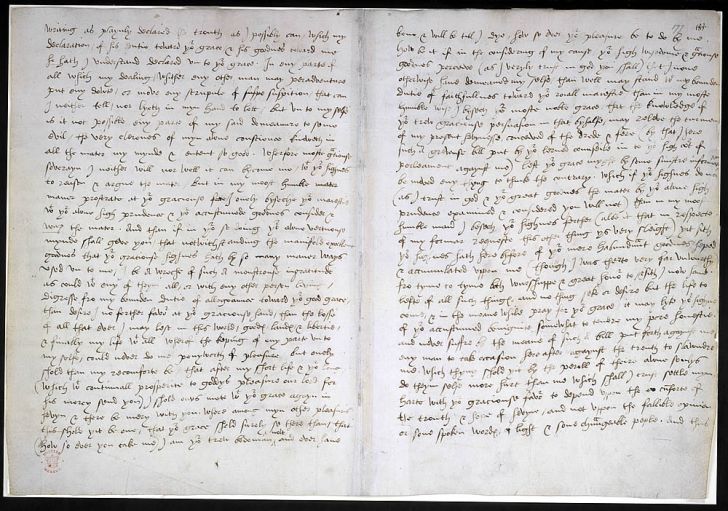Sir Thomas More in his own words
Jump to navigation
Jump to search
Thomas More - Historical Profile
Thomas More - Historical Profile
| | in his own words Click EasyEdit to update this page! (Don't see the EasyEdit button above? <a href="/#signin" target="_self">Sign in</a> or <a href="/accountnew" target="_self">Sign up</a>.) | |
 <a class="external" href="http://www.bl.uk/onlinegallery/onlineex/henryviii/greatmatter/lastletter/index.html" rel="nofollow" target="_blank" title="[Source: British Library online]">[Source: British Library online]</a> "In this, the last of his six extant letters to Henry, More began by giving an account of his resignation, saying that Henry, then, had promised ‘that for the service which I byfore had done you (which it than lyked your goodnes far above my deserving to commend) that in eny suit that I should after have un to your Highnes… I should fynd your Highnes good and graciouse lord unto me’.Now, taking Henry up on his offer, More accordingly petitioned the King not to listen to such ‘sinistre information’ as might have been given against him. He protested his honesty and sincerity in Barton’s case, and urged that, if the King, after reconsidering the matter, still suspects him to be ‘a wreche of such a monstrouse ingratitude’, then his only comfort would be that ‘I shold onys mete with your Grace agayn in hevyn, and there be mery with you.’" |
| Sir Thomas More Quotes and Quotations Better 'tis to be fortunate than wise! — "The Words of Fortune to the People" (c.1504) Divers heads, divers wits. — "To Them Who Trust in Fortune" None falleth far but he who climbeth high. — "To Them Who Trust in Fortune" Men use, if they have an evil turn, to write it in marble; and whoso doth us a good turn, we write it in dust. — History of King Richard III (c.1513-1518) What you cannot turn to good, you must at least make as little bad as you can. — Utopia, Bk. 1. (1516) Extreme justice is an extreme injury: for we ought not to approve of those terrible laws that make the smallest offences capital, nor of that opinion of the Stoics that makes all crimes equal; as if there were no difference to be made between the killing a man and the taking his purse, between which, if we examine things impartially, there is no likeness nor proportion. — Utopia, Bk 1. (1516) They have no lawyers among them, for they consider them as a sort of people whose profession it is to disguise matters. — Utopia, Bk. 2. (1516) All things appear incredible to us, as they differ more or less from our own manners. — Utopia, Bk 2. (1516) Man's folly hath enhanced the value of gold and silver because of their scarcity; whereas nature, like a kind parent, hath freely given us the best things, such as air, earth, and water, but hath hidden from us those which are vain and useless. — Utopia, Bk 2. (1516) When public judicatories are swayed by avarice or partiality, justice, the grand sinew of society, is lost. — Utopia, Bk 2. (1516) While there is nothing so neat and witty that will not be made insipid by silly and inconsiderate loquacity, so also there is nothing in itself so insipid, that you cannot season with grace and wit if you give a little thought to it. — A Letter to his Children, 1522. Although poets are with many men taken but for painted words, yet do they much help the judgment, and make a man among other things well furnished in one special thing, without which all learning is half lame... a good mother wit. — A Dialogue Concerning Heresies (1529) If any good thing shall go forward, something must be adventured. — A Dialogue Concerning Heresies (1529) A faint faith is better than a strong heresy. — A Dialogue Concerning Heresies (1529) A tale that fleeth through many mouths catcheth many feathers. — A Dialogue Concerning Heresies (1529) I do not care very much what men say of me, provided that God approves of me. — A Letter to Erasmus, 1532. We see that this man fareth as one that walked bare-foot upon a field full of thorns, that wotteth not where to tread. — Confutation of Tyndales's Answer (1532) He will bring forth for the plain proof his old three worshipful witnesses, which stand yet all unsworn, that is to wit: Some-say, and They-say, and Folk-say. — Confutation of Tyndales's Answer (1532) He spinneth that fine lie with flax, fetching it out of his own body, as the spider spinneth her cobweb. — Confutation of Tyndales's Answer (1532) Heretics be they that obstinately hold any self-minded opinion contrary to the doctrine that the common known Catholic Church teacheth and holdeth for necessary to salvation. — Debellation of Salem and Bizance (1533) I never saw fool yet that thought himself other than wise. — A Dialogue of Comfort Against Tribulation (1534) A fond old man is often as full of words as a woman. — A Dialogue of Comfort Against Tribulation (1534) Many a man buyeth hell with so much pain, that he might have heaven with less than the one half. — A Dialogue of Comfort Against Tribulation (1534) He that biddeth other folk do well, and giveth evil example with the contrary deed himself, fareth even like a foolish weaver, that would weave a part with his one hand and unweave a part with his other. — A Dialogue of Comfort Against Tribulation (1534) I do nobody harm, I say none harm, I thinke none harm, but wish everybody good. And if this be not enough to keep a man alive, in good faith I long not to live. — Letter to his daughter, Margaret, 1535. |